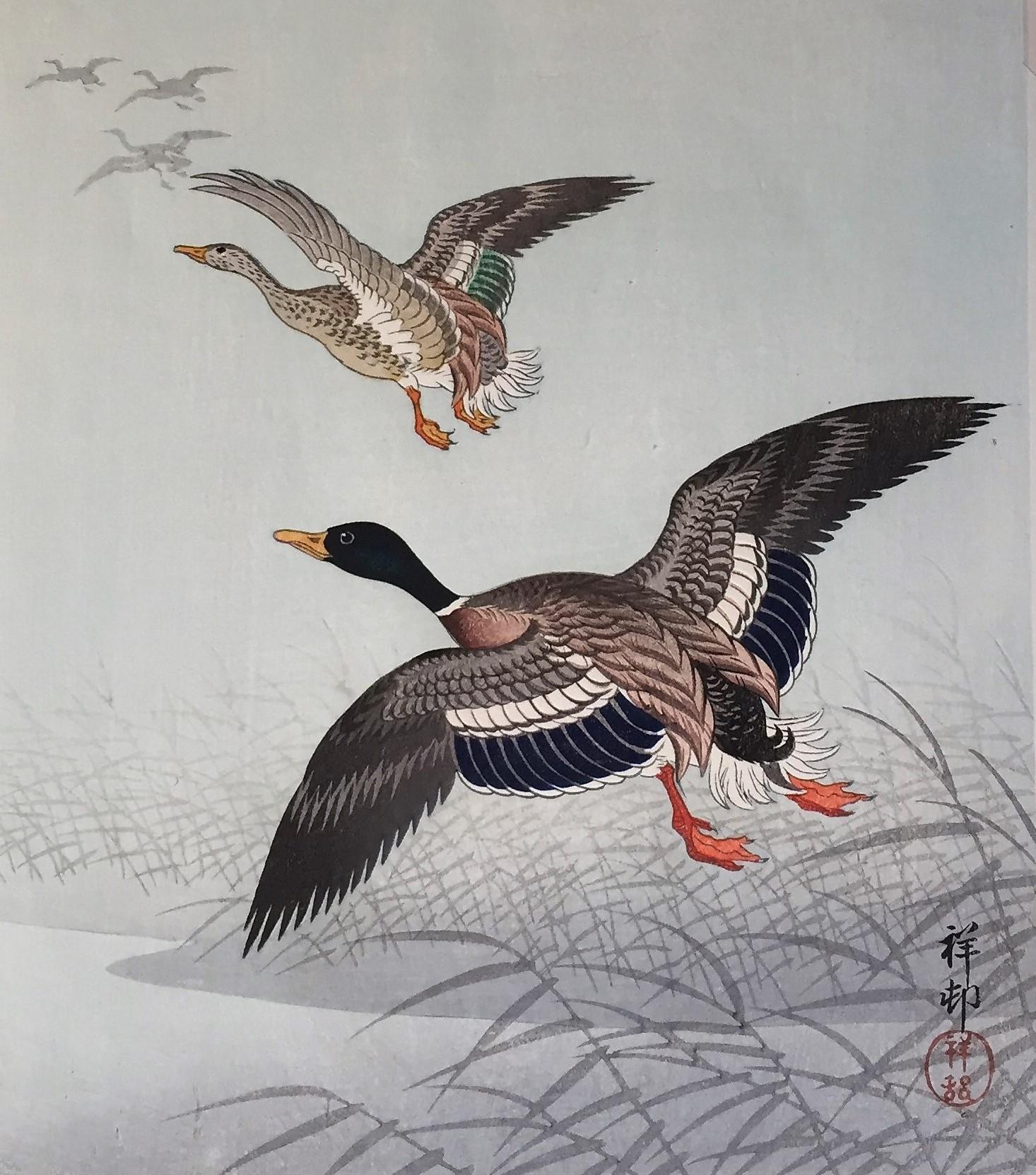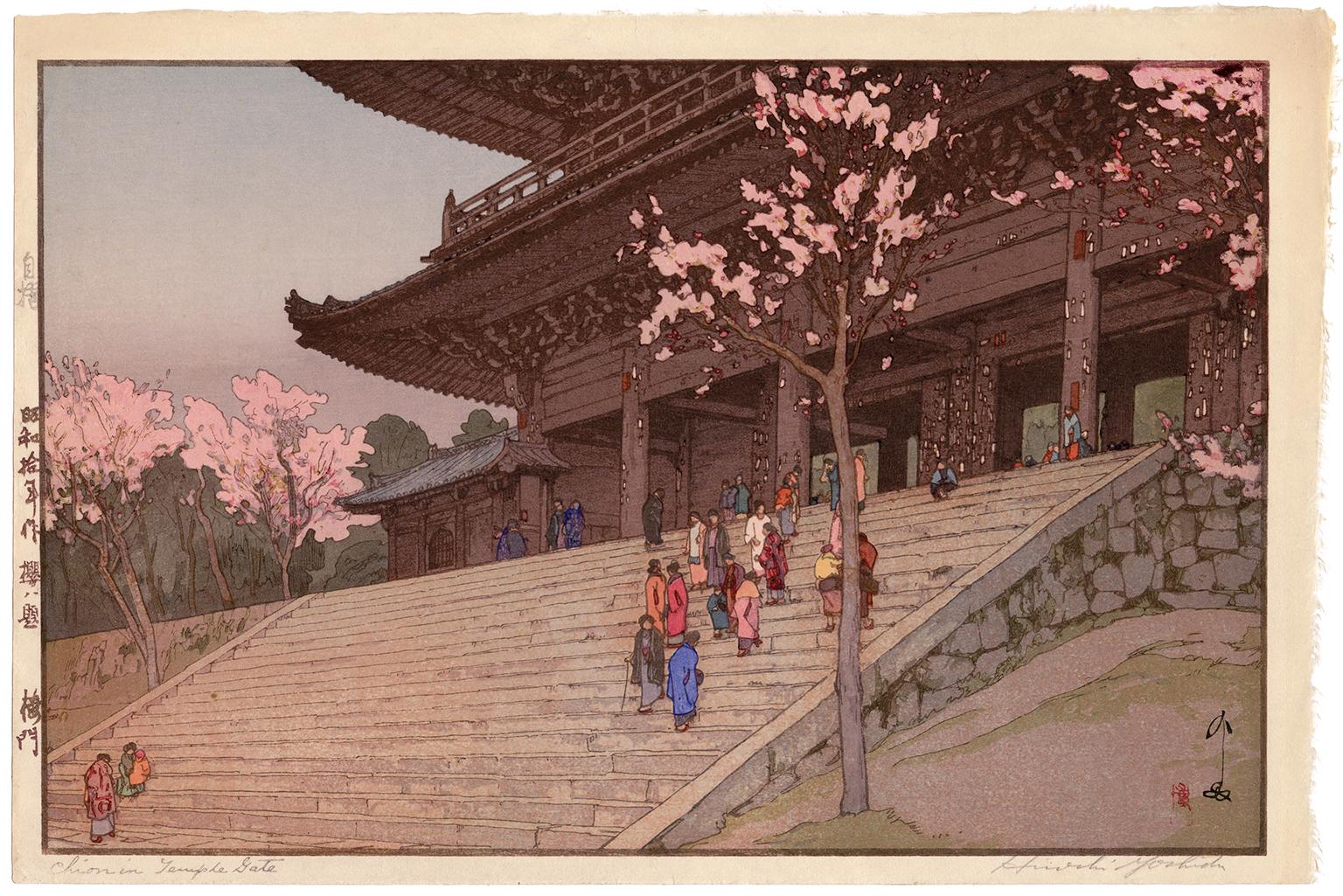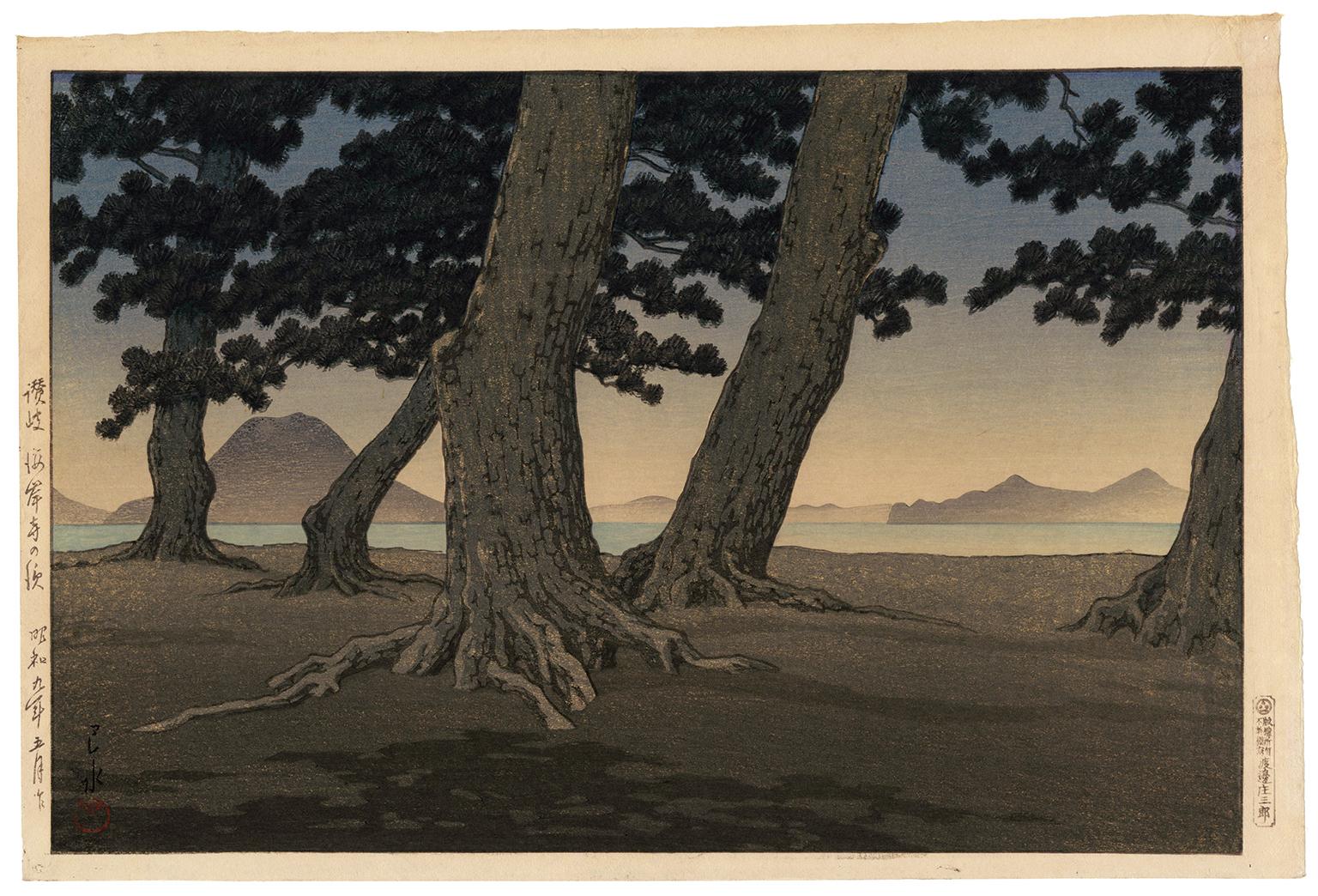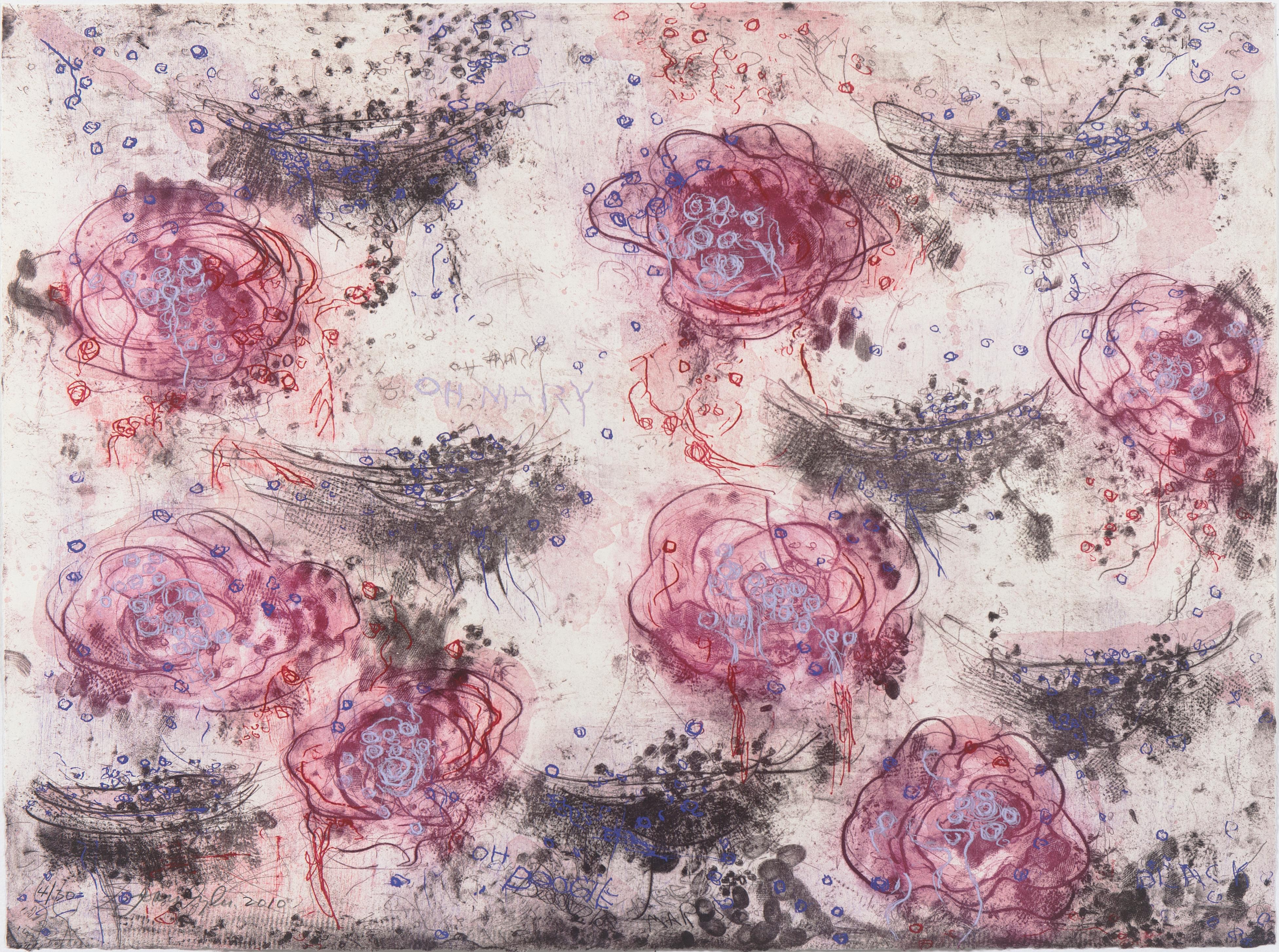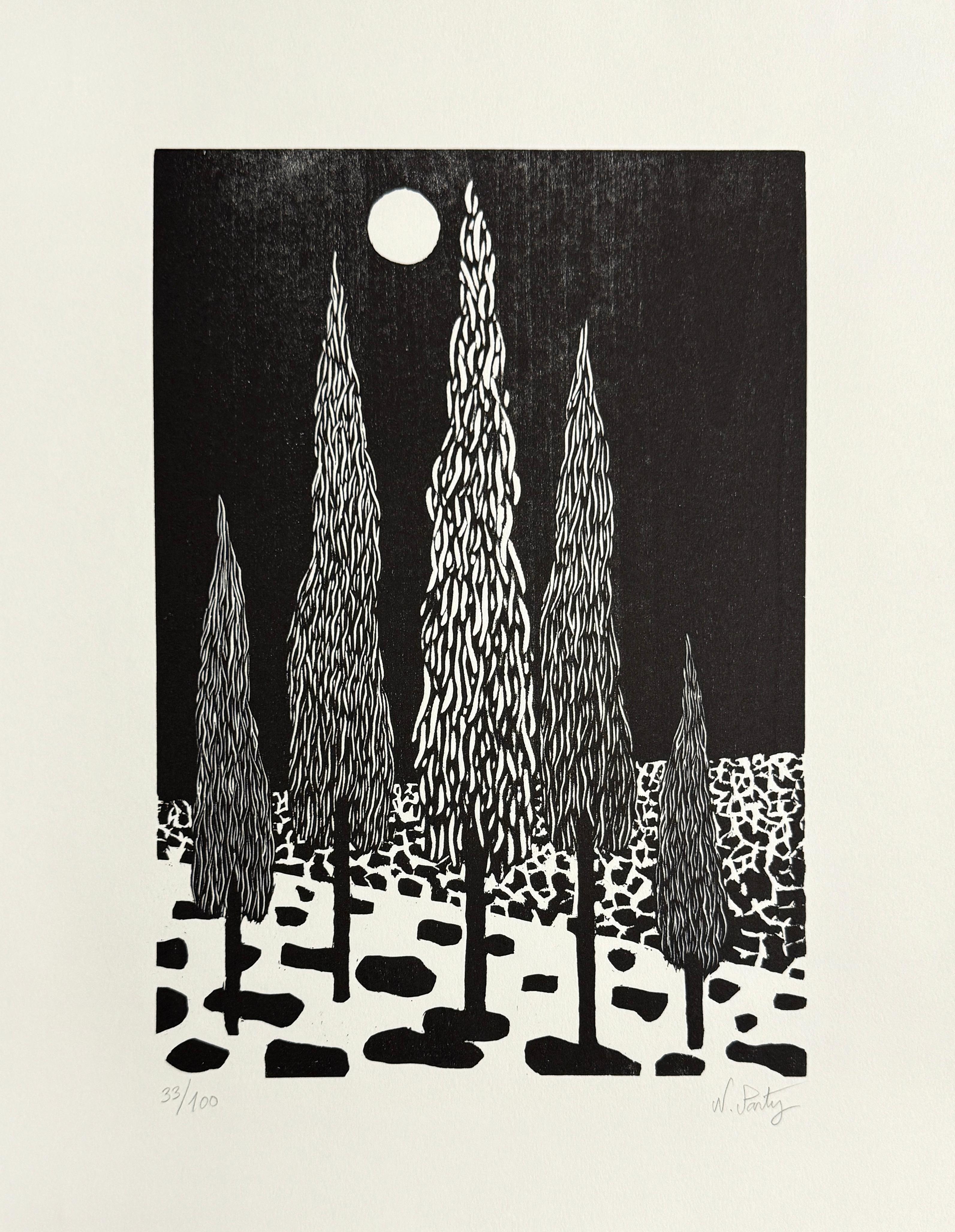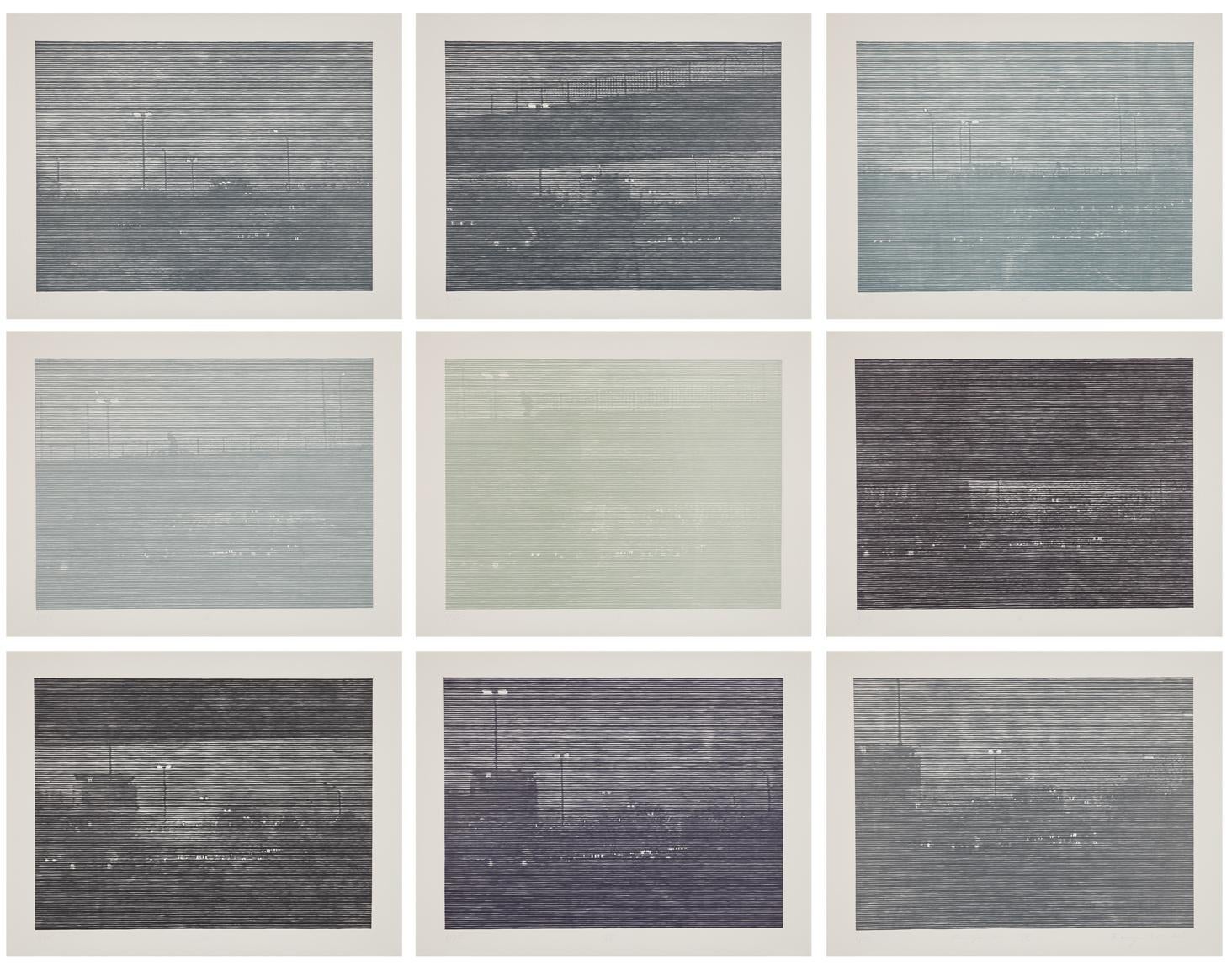Items Similar to 'Peking - Paifang Gate' — Mid-Century Watanabe Color Woodcut
Want more images or videos?
Request additional images or videos from the seller
1 of 3
Cyrus Le Roy Baldridge'Peking - Paifang Gate' — Mid-Century Watanabe Color Woodcut1925
1925
About the Item
Cyrus Le Roy Baldridge, 'Peking '25', woodblock print, published 1926. Signed, titled, dated, and annotated 'No 124' in pencil. A fine impression, with fresh, undiminished colors; the full sheet, in excellent condition. Watanabe 6 mm seal, lower right, indicating an impression printed between 1945 and 1957. Archivally sleeved, unmatted.
Image size 9 5/8 x 14 5/16 inches; sheet size 10 7/16 x 15 3/8 inches.
ABOUT THE IMAGE
A 'paifang', also known as a 'pailou', is a traditional style of Chinese architectural arch or gateway structure. It has been theorized that the paifang gate architecture was influenced by Buddhist torana temple gates. Paifang are designed with traditional Chinese architectural motifs including multi-tiered roofs, prominent supporting posts, and gracefully arched openings.
This is an unusual ukiyo-e or 'floating world' woodcut published by Watanabe Shozaburo, Tokyo, in that the subject is of an early 20th-century scene in Peking, China.
ABOUT THE ARTIST
Cyrus Leroy Baldridge (1889–1977) was a noted illustrator, painter, printmaker, and writer. At the age of 10, he became the youngest student at Frank Holme’s Chicago School of Illustration. In 1907, he was accepted at the University of Chicago, where he continued his art education and graduated in 1911. Following graduation, Baldridge worked as an illustrator, later becoming a war correspondent on the battlefront during WWI. After the war, he settled in upstate New York and continued to work as a writer and illustrator while traveling the world with his wife, Caroline Singer, who was also a writer. The couple traveled from Africa to India and Japan in the 1920s.
Japanese art profoundly influenced Baldridge’s work—during his time in Japan, he met the famed Shin Hanga print publisher Watanabe Shozaburo in Tokyo. He produced several woodblock prints for Watanabe during the 1920s and 1930s. In 1952, he and his wife retired to Santa Fe, where he satisfied his taste for adventure, hiking the mountains of New Mexico and painting the landscape in oil and watercolor.
- Creator:Cyrus Le Roy Baldridge (1889 - 1977)
- Creation Year:1925
- Dimensions:Height: 9.63 in (24.47 cm)Width: 14.38 in (36.53 cm)
- Medium:
- Movement & Style:
- Period:
- Condition:
- Gallery Location:Myrtle Beach, SC
- Reference Number:
About the Seller
5.0
Recognized Seller
These prestigious sellers are industry leaders and represent the highest echelon for item quality and design.
Platinum Seller
These expertly vetted sellers are 1stDibs' most experienced sellers and are rated highest by our customers.
Established in 1995
1stDibs seller since 2016
254 sales on 1stDibs
Typical response time: 1 hour
Associations
International Fine Print Dealers Association
- ShippingRetrieving quote...Ships From: Myrtle Beach, SC
- Return PolicyA return for this item may be initiated within 7 days of delivery.
More From This SellerView All
- 'Chion-in Temple Gate' from 'Eight Scenes of Cherry Blossoms' — Jizuri SealBy Hiroshi YoshidaLocated in Myrtle Beach, SCHiroshi Yoshida, 'Chion-in Temple Gate (Sunset)' from the series 'Eight Scenes of Cherry Blossoms (Sakura hachi dai: Sakura mon)', color woodblock print, 1935. Signed in brush 'Yoshida' and in pencil 'Hiroshi Yoshida'. A superb, early impression, with fresh colors; the full sheet with margins, on cream Japan paper; an area of slight toning in the top right sheet corner, not affecting the image, otherwise in excellent condition. Marked with a jizuri (self-printed) seal, upper left margin. Self-published by the artist. Image size 9 5/8 x 14 3/4 inches (444 x 375 mm); sheet size 10 7/8 x 16 inches (276 x 406 mm). Archivally sleeved, unmatted. Provenance: M. Nakazawa, Tokyo. Literature: Japanese Landscapes of the 20th century (Hotei Publishing calendar), 2001, May. Collections: Honolulu Museum of Art, Museum of Fine Arts, Boston. ABOUT THE IMAGE Located in Kyoto, Chionin is the main temple of the Jodo sect of Japanese Buddhism, one of the most popular Buddhist sects in Japan, having millions of followers. The Sanmon Gate, Chionin's entrance gate, standing 24 meters tall and 50 meters wide, it is the largest wooden temple gate in Japan and dates back to the early 1600s. Behind the gate, a wide set of stairs leads to the main temple grounds. ABOUT THE ARTIST Painter and printmaker Yoshida Hiroshi (1876-1950) is regarded as one of the greatest artists of the Japanese 'shin hanga' (New Print) movement. Yoshida was born as the second son of Ueda Tsukane in Kurume, Fukuoka Prefecture, a schoolteacher from an old samurai family. In 1891 he was adopted by his art teacher Yoshida Kasaburo in Fukuoka and took his surname. In 1893 he went to Kyoto to study painting, and the following year to Tokyo to join Koyama Shotaro's Fudosha private school; he also became a member of the Meiji Fine Arts Society. These institutions taught and advocated Western-style painting, greatly influencing Yoshida’s artistic development. In 1899 Yoshida had his first American exhibition at Detroit Museum of Art (now Detroit Institute of Art), making the first of many visits to the US and Europe. In 1902 he helped reorganize the Meiji Fine Arts Society, renaming it the Taiheiyo-Gakai (Pacific Painting...Category
1930s Showa Figurative Prints
MaterialsWoodcut
- The Beach at Kaiganji in Sanuki Province — Lifetime Impression, 1934By Kawase HasuiLocated in Myrtle Beach, SCThe Beach at Kaiganji in Sanuki Province (Sanuki Kaiganji no hama), from the series Collected Views of Japan II, Kansai Edition (Nihon fûkei shû II Kansai hen), woodblock print, 1934. A very fine, atmospheric impression, with fresh colors; the full sheet, in excellent condition. Signed 'Hasui' with the artist’s seal 'Kawase', lower left. Published by Watanabe Shozaburo with the Watanabe ‘D’ seal indicating an early impression printed between 1931 - 1941. Stamped faintly 'Made in Japan' in the bottom center margin, verso. Horizontal ôban; image size 9 3/8 x 14 1/4 inches (238 x 362 mm); sheet size approximately 10 5/16 x 15 1/2 inches ( 262 x 394 mm). Collections: Art Institute of Chicago; Austrian Museum of Applied Arts (Vienna); Honolulu Museum of Art; Museum of Fine Arts, Boston; National Museum in Warsaw; University of Wisconsin-Madison. ABOUT THE ARTIST “I do not paint subjective impressions. My work is based on reality...I can not falsify...(but) I can simplify…I make mental impressions of the light and color at the time of sketching. While coloring the sketch, I am already imagining the effects in a woodblock print.” — Kawase Hasui Hasui Kawase...Category
1930s Showa Landscape Prints
MaterialsWoodcut
- 'Hill' — 1930s American ModernismBy Paul LandacreLocated in Myrtle Beach, SCPaul Landacre, 'Hill', wood engraving, 1936, edition 60 (only 54 printed); only 2 impressions printed in a second edition of 150. Signed, titled, and numbered '49/60' in pencil. Wien...Category
1930s American Modern Landscape Prints
MaterialsWoodcut
- 'Taos Placita' — 1940s Southwest RegionalismBy Gustave BaumannLocated in Myrtle Beach, SCGustave Baumann, 'Taos Placita', color woodcut, 1947, edition 125. Baumann 132. Signed, titled, and numbered '20-125' in pencil; with the artist’s Hand-in-Heart chop. A superb, richly-inked impression, with fresh colors, on fibrous oatmeal wove paper; the full sheet with margins (2 to 3 1/8 inches); slight rippling at the left sheet edge, in excellent condition. Matted to museum standards, unframed. Image size 9 5/8 x 11 1/4 inches (244 x 286 mm); sheet size 13 1/4 x 17 inches (337 x 432 mm). Collections: New Mexico Museum of Art, Phoenix Art Museum, Wichita Art Museum. ABOUT THE ARTIST Gustave Baumann (1881-1971) was a renowned printmaker and a leading figure of the American color woodcut revival whose exquisite craftsmanship and vibrant imagery captured the essence of the Southwest. "A brilliant printmaker, Baumann brought to the medium a full mastery of the craft of woodworking that he acquired from his father, a German cabinetmaker. This craftsmanship was coupled with a strong artistic training that resulted in the handsome objects we see in the exhibition today. After discovering New Mexico in 1918, Baumann began to explore in his woodblock prints of this period the light. color, and architectural forms of that landscape. His prints of this period are among the most beautiful and poetic images of the American West." —Lewis I. Sharp, Director, Denver Art Museum Baumann, the son of a craftsman, immigrated to the United States from Germany with his family when he was ten, settling in Chicago. From 1897 to 1904, he studied in the evenings at the Art Institute of Chicago, working in a commercial printmaking shop during the day. In 1905, he returned to Germany to attend the Kunstwerbe Schule in Munich, where he decided on a career in printmaking. He returned to Chicago in 1906 and worked for a few years as a graphic designer of labels. Baumann made his first prints in 1909 and exhibited them at the Art Institute of Chicago the following year. In 1910, he moved to the artists’ colony in Nashville, Indiana, where he explored the creative and commercial possibilities of a career as a printmaker. In 1915, he exhibited his color woodcuts at the Panama-Pacific International Exposition in San Francisco, winning the gold medal. Among Baumann’s ongoing commercial activities was his work for the Packard Motor Car Company from 1914 to 1920 where he produced designs, illustrations, and color woodcuts until 1923. In 1919, Baumann’s printmaking work dominated the important exhibition of American color woodcuts at the Detroit Institute of Arts. Twenty-six of his prints were included, far more than the works of any other artist. A set of his blocks, a preparatory drawing, and seven progressive proofs complemented the exhibition. That same year, Baumann worked in New York and, over the summer, in Provincetown, Massachusetts. His airy images of Cape Cod employed soft, pastel colors and occasionally showed the influence of the white-line woodcut technique. Many of his Chicago artist friends had traveled to the southwest, and Baumann became intrigued by their paintings, souvenirs, and stories of an exotic place named Taos, New Mexico. In the summer of 1918, he spent the summer in Taos sketching and painting before visiting Santa Fe. Paul Walter, the director of the Museum of New Mexico, offered him a studio in the museum's basement. Inspired by the rugged beauty of the Southwest—the vibrant colors and dramatic landscapes of the region became a central theme in his work, influencing his artistic style and subject matter for the remainder of his career. Later in the decade, he traveled to the West Coast and made prints of California landscape. Baumann's prints became synonymous with the Southwest, capturing the spirit of its place in America's identity with a unique sense of authenticity and reverence. His iconic images of desert vistas, pueblo villages, and indigenous cultures served as visual tributes to the region's rich cultural heritage, earning him a dedicated following among collectors and curators alike. A true craftsman and artist, Baumann completed every step of the printmaking process himself, cutting each block, mixing the inks, and printing every impression on the handmade paper he selected. His dedication to true craftsmanship and his commitment to preserving the integrity of his artistic vision earned him widespread acclaim and recognition within the art world. About the vibrant colors he produced, Baumann stated, “A knowledge of color needs to be acquired since they don’t all behave the same way when ground or mixed...careful chemistry goes into the making of colors, with meticulous testing for permanence. While complicated formulae evolve new colors, those derived from Earth and metal bases are still the most reliable.” In the 1930s, Baumann became interested in puppet theater. He designed and carved his own marionettes and established a little traveling company. From 1943 to 1945, the artist carved an altarpiece for the Episcopal Church of the Holy Faith in Santa Fe. In 1952, a retrospective exhibition of his prints was mounted at the New Mexico Museum of Fine Arts. Throughout his prolific career, Baumann executed nearly four hundred color woodcuts. Baumann’s woodcuts...Category
1940s American Modern Landscape Prints
MaterialsWoodcut
- Kintai Bridge at Iwakuni in Suo Province (Suo iwakuni kintai-bashi), 1859By Hiroshige IILocated in Myrtle Beach, SCUtagawa Hiroshige II (1829-1869), 'Kintai Bridge at Iwakuni in Suo Province' (Suo iwakuni kintai-bashi), from the series 'One Hundred Views of Famous Pla...Category
1850s Edo Landscape Prints
MaterialsWoodcut
- 'Garyu no sakura' (The Lying Dragon Cherry Tree, Gifu) — Contemporary JapaneseLocated in Myrtle Beach, SCHajime Namiki, 'Garyu no sakura (The Lying Dragon Cherry Tree, Gifu)', color woodcut, 2003, edition 200. Signed in pencil and with the artist’s red seal....Category
Early 2000s Contemporary Landscape Prints
MaterialsWoodcut
You May Also Like
- White Fronted Geese Flying above Reeds and Water.By Ohara KosonLocated in Storrs, CTWhite-Fronted Geese Flying above Reeds and Water. c. 1933. Shikishiban: 10 10/16 x 9 1/16 (sheet 10 14/16 x 9 12/16). Signed and sealed Shoson. Publisher: Watanabe Shozaburo. Illustrated: Crows, Cranes & Camellias, S11.6, p. 197. Stamped "made in Japan" verso, indicating that it was printed for the United States after 1921. A fine impression with subtle shading and gauffrauge in the 2 large birds' feathers. Based on the body markings, these actually appear to be mallard ducks, not geese. Good olor and condition Housed in a 20 x 16-inch archival mat. Koson Ohara...Category
Early 20th Century Showa Animal Prints
MaterialsColor, Woodcut
- Wild RosesBy Joan SnyderLocated in Brooklyn, NYWild Roses, 2010 Lithograph/etching/woodcut 28 3/8 × 38 3/8 in 72.1 × 97.5 cm This print combines etching, lithography, and woodcut to create a great variet...Category
2010s Contemporary Landscape Prints
MaterialsEtching, Lithograph, Woodcut
- TreesBy Nicolas PartyLocated in London, GBWoodcut on BFK Rives paper, produced in 2020. Edition of 100. Mint condition, unframed. Signed and numbered in pencil by Nicolas Party.Category
2010s Contemporary Landscape Prints
MaterialsWoodcut
- "Nachtfahrt"By Christiane BaumgartnerLocated in Köln, DEA wonderful and delicate portfolio by Christiane Baumgartner, artist from Leipzig/Germany. "Nachtfahrt" (night tour) consists of 9 woodcut prints on Zerkall laid paper. Each work has...Category
Early 2000s Contemporary Landscape Prints
MaterialsWoodcut
- Fictive HomelandsLocated in Providence, RIFictive Homelands is a suite of 7 woodcut prints with silverpoint drawing on mylar by artist Serena Perrone. Fictive Homelands is a series of works that use the theater proscenium ...Category
Early 2000s Contemporary Landscape Prints
MaterialsSilver
- The Colors of a Cholla Cactus After Rain in the Late Summer or Early Fall (LEFT)Located in Santa Fe, NMLayering fabrics, dyes, pigments, crystals, and various other natural materials, Martha Tuttle is a master of juxtaposing textures to explore the relationship between humans and the physical world. Her unique artworks draw upon a variety of mediums to create harmonious compositions vibrating with her artistic energy. Tuttle’s new triptych of prints — "The Colors of a Cholla Cactus...Category
2010s Abstract Abstract Prints
MaterialsIntaglio, Woodcut
Recently Viewed
View AllMore Ways To Browse
1920s Japan
1920s Japanese
Chinese Landscape Mountain
Le Couple
Le 5 A 7
Chinese Woodblock
African Woodcut
Japanese Mountain Watercolor
China Woodcut
Chinese Woodcut
Chinese Woodcut Print
Mexican Fedder
Watanabe Artist
Woodblock India
1930s Woodblock
Chinese Painting 7 By 9 Signed
Japanese Woodblock Couple
Cyrus Leroy Baldridge
